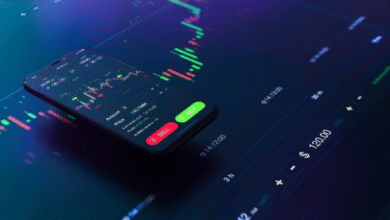
In today’s dynamic investment landscape, Exchange-Traded Funds (ETFs) have emerged as a simplified gateway for market participation. HDFC SKY, an innovative platform from HDFC Bank, enhances this experience by offering a comprehensive suite of investment options, all while minimizing costs and maximizing tools for savvy traders.
Understanding ETFs: A Comprehensive Overview
Exchange-Traded Funds (ETFs) have emerged as a popular investment vehicle, combining features of mutual funds and individual stocks. Unlike traditional mutual funds, which are bought and sold at the end of the trading day, ETFs trade on stock exchanges throughout the day, allowing investors to buy and sell shares at market prices. This flexibility enables investors to capitalize on market fluctuations in real time. ETFs typically track an index, commodity, or a basket of assets, providing diversification and lowering the risk associated with individual stocks. They also tend to have lower expense ratios compared to mutual funds, making them a cost-effective option for both novice and experienced investors.
HDFC SKY is a comprehensive investment platform that simplifies the process of investing in various financial instruments, including ETFs. With zero account-opening charges and a flat brokerage fee of ₹20 per trade, the platform is designed to make trading accessible and affordable for all investors. HDFC SKY offers advanced trading tools, such as option-chain analysis and margin trading, which can enhance the trading experience for those looking to engage in more sophisticated strategies. By providing a single app for stocks, mutual funds, IPOs, and commodities, HDFC SKY streamlines the investment process, allowing users to manage their portfolios effectively and take advantage of diverse investment opportunities, including ETFs.
ETFs have emerged as a popular choice among investors seeking diversified portfolios with the flexibility of trading like stocks. HDFC SKY accommodates this growing demand by providing seamless integration of ETFs into its investment platform. The intuitive interface and real-time market data ensure that both novice and experienced investors can make informed decisions with ease. Furthermore, the platform’s educational resources arm users with the knowledge needed to harness the full potential of their ETF investments, securing a balanced and strategically diversified portfolio to meet their long-term financial goals.
The Evolution of Exchange-Traded Funds
The evolution of Exchange-Traded Funds (ETFs) has transformed the investment landscape since their inception in the early 1990s. Initially designed to provide investors with a more accessible and cost-effective way to invest in diversified portfolios, ETFs have grown exponentially in popularity and sophistication. The first ETF, the SPDR S&P 500 ETF (SPY), was launched in 1993, allowing investors to buy a single security that tracked the performance of the S&P 500 index. Since then, the ETF market has expanded to include a wide array of asset classes, including international equities, bonds, commodities, and thematic investments. This evolution has been driven by advancements in technology, which have enabled the creation of more complex and niche ETFs, as well as increased investor demand for low-cost investment vehicles that offer liquidity and transparency.
HDFC SKY, HDFC Bank’s comprehensive investment platform, reflects the growing trend of digitalization in the finance sector, particularly in the context of ETFs and other investment products. By offering a diverse range of investment options, including stocks, mutual funds, IPOs, and commodities, HDFC SKY caters to the needs of modern investors seeking convenience and efficiency. The platform’s zero account-opening charges and flat ₹20 brokerage per trade make it an attractive option for both novice and seasoned investors. Additionally, advanced tools such as option-chain analysis and margin trading empower users to make informed decisions and optimize their trading strategies. As the ETF market continues to evolve, platforms like HDFC SKY are positioned to play a pivotal role in democratizing access to various investment vehicles, making it easier for individuals to participate in the financial markets.
Key Features of ETFs: Liquidity and Flexibility
Exchange-Traded Funds (ETFs) are distinguished by their inherent liquidity, allowing investors to buy and sell shares throughout the trading day on stock exchanges, much like individual stocks. This feature is particularly advantageous for those seeking to capitalize on short-term market movements or for investors who value the ability to access their funds quickly. Unlike mutual funds, which are priced at the end of the trading day, ETFs provide real-time pricing, enabling traders to execute transactions at their desired price points. This liquidity is further enhanced by the presence of market makers who ensure there is sufficient buying and selling activity, thus reducing the bid-ask spread and facilitating smoother transactions. HDFC SKY’s platform offers seamless access to ETFs, making it easier for users to leverage this liquidity in their investment strategies.
MTF on ETFs further amplifies the advantages of ETFs by allowing investors to engage in margin trading, thereby enhancing their investment capacity. With margin trading, investors can leverage their capital to take larger positions in ETFs, optimizing potential returns from favorable market conditions while still benefiting from the flexibility and liquidity intrinsic to ETFs. This feature enables sophisticated investors to implement strategies that require more capital than what is immediately available to them. HDFC SKY’s platform simplifies accessing MTF on ETFs, providing a robust framework for those looking to maximize their market exposure.
Flexibility is another key attribute of ETFs that appeals to a diverse range of investors. They can be tailored to suit various investment goals, whether one is looking for income, growth, or exposure to specific sectors or asset classes. With HDFC SKY, for instance, investors can not only trade ETFs but also integrate them with other investment vehicles like stocks and mutual funds under a single app. This all-in-one approach fosters a holistic investment strategy, allowing users to react to market changes by reallocating funds between different asset types effortlessly. Additionally, the low-cost structure, characterized by flat ₹20 brokerage per trade, means that both casual investors and active traders can manage their portfolios without incurring significant costs, thus maximizing overall investment flexibility and efficiency.
How ETFs Compare to Traditional Mutual Funds
Exchange-Traded Funds (ETFs) and traditional mutual funds serve similar investment purposes but differ significantly in structure and trading mechanics. ETFs are traded on stock exchanges, allowing investors to buy and sell shares throughout the trading day at market prices, which can fluctuate based on supply and demand. This feature provides real-time pricing and greater liquidity. In contrast, traditional mutual funds are priced only once at the end of the trading day, with transactions executed at the net asset value (NAV) calculated after market close. Additionally, while ETFs typically have lower expense ratios due to their passive management style, traditional mutual funds often incur higher fees, particularly those that are actively managed.
The HDFC SKY platform exemplifies how investors can conveniently access both ETFs and traditional mutual funds under one roof. Users benefit from zero account-opening charges and a flat brokerage fee of ₹20 per trade, making it cost-effective to manage a diversified portfolio. HDFC SKY also provides advanced tools such as option-chain analysis and margin trading, enhancing the investment experience. With these features, investors can strategically utilize ETFs for tactical trading while also accessing traditional mutual funds for long-term growth, all from a single, user-friendly application.
Titan share price tracking is seamlessly integrated within HDFC SKY, enabling investors to stay informed and make timely decisions. The platform’s intuitive interface ensures a smooth user experience, while real-time data and analytical tools empower users to analyze market trends effectively. Whether focusing on short-term gains or long-term wealth accumulation, the platform’s comprehensive resources cater to diverse investment strategies. With HDFC SKY’s robust capabilities, even novice investors can navigate the complexities of the financial markets with confidence, optimizing their portfolios through informed choices and strategic planning.
The Benefits of Investing in ETFs
Investing in Exchange-Traded Funds (ETFs) offers numerous advantages, particularly for those using platforms like HDFC SKY. One of the primary benefits is diversification; ETFs typically hold a basket of securities, allowing investors to gain exposure to various assets within a single investment. This diversification helps mitigate risk, as the performance of individual securities can vary. Moreover, ETFs generally have lower expense ratios compared to mutual funds, making them more cost-efficient over time. HDFC SKY’s platform facilitates easy access to a wide range of ETFs, enabling investors to build a balanced portfolio tailored to their risk tolerance and financial goals. The platform’s zero account-opening charges and flat ₹20 brokerage per trade further enhance the affordability of ETF investments, encouraging more individuals to participate in the market.
Another significant benefit of investing in ETFs is their liquidity and flexibility. Unlike mutual funds, which can only be traded at the end of the trading day, ETFs can be bought and sold throughout market hours at real-time prices. This feature allows investors to respond quickly to market changes, making it easier to capitalize on short-term opportunities. HDFC SKY enhances this experience by providing advanced tools such as option-chain analysis and margin trading, helping investors make informed decisions. Additionally, the comprehensive nature of HDFC SKY’s investment platform, which includes stocks, mutual funds, IPOs, and commodities, allows investors to seamlessly diversify their portfolios beyond just ETFs, all within a single app. This integration simplifies the investment process, making it accessible for both novice and experienced investors.
Types of ETFs: Exploring Various Categories
Exchange-Traded Funds (ETFs) come in various categories, each designed to cater to different investment strategies and objectives. Broadly, these can be classified into equity ETFs, fixed income ETFs, commodity ETFs, and sector-specific ETFs. Equity ETFs track stock indices, providing investors exposure to a diverse range of companies while minimizing individual stock risk. Fixed income ETFs, on the other hand, invest in bonds, offering a steadier income stream and capital preservation. Commodity ETFs allow investors to gain exposure to physical goods like gold or oil, often serving as a hedge against inflation. Sector-specific ETFs focus on particular industries, such as technology or healthcare, allowing investors to capitalize on sector trends without needing to pick individual stocks.
In addition to these categories, innovative structures like thematic ETFs and actively managed ETFs have emerged. Thematic ETFs focus on investment themes, such as sustainability or artificial intelligence, which may resonate with investors looking to align their portfolios with personal values or market trends. Actively managed ETFs, unlike traditional ETFs that passively track indices, employ a team of managers to make investment decisions, potentially offering higher returns at the cost of higher fees. Platforms like HDFC SKY streamline access to these diverse ETF options, offering investors the tools and resources needed to navigate the complex landscape of exchange-traded funds effectively. With zero account-opening charges and flat brokerage fees, HDFC SKY enables investors to explore various ETF categories seamlessly and make informed investment choices.
ETFs app offers a user-friendly interface for both novice and experienced investors seeking to diversify their portfolios with ease. By providing real-time market data and advanced analytical tools, the app empowers users to make timely and informed decisions about their investments. Whether you’re interested in trending thematic ETFs or seeking higher returns with actively managed options, this platform simplifies the investment process. Enhanced by educational resources and support, investors can confidently navigate the evolving ETF market, maximizing potential returns while managing risk efficiently.
The Mechanics of Trading ETFs
Trading Exchange-Traded Funds (ETFs) involves several key mechanics that differentiate them from traditional mutual funds. ETFs are traded on stock exchanges like individual stocks, allowing investors to buy and sell shares throughout the trading day at market prices. The pricing of an ETF is influenced by the underlying assets it holds, which typically consist of a basket of stocks or commodities that reflect a particular index or sector. Investors can execute trades via platforms like HDFC SKY, which offers a seamless experience for trading ETFs alongside other investment vehicles. HDFC SKY’s zero account-opening charges and flat ₹20 brokerage per trade make it an attractive choice for both novice and seasoned traders looking to capitalize on the liquidity and flexibility that ETFs provide.
One of the advantages of using HDFC SKY is its suite of advanced trading tools that enhance the ETF trading experience. The platform features tools such as option-chain analysis, which allows traders to assess the potential profitability of various options strategies related to ETFs. Margin trading is also available, enabling investors to leverage their positions and potentially amplify returns, albeit with increased risk. Moreover, with a user-friendly interface, HDFC SKY simplifies the process of tracking market trends and executing trades efficiently. As ETFs continue to gain popularity for their diversification and cost-effectiveness, platforms like HDFC SKY are well-positioned to cater to a growing base of investors seeking comprehensive trading solutions.
Tax Efficiency: How ETFs Minimize Capital Gains
Tax efficiency is a crucial consideration for investors, particularly when it comes to minimizing capital gains taxes. Exchange-Traded Funds (ETFs) offer a distinct advantage in this regard due to their unique structure and trading mechanisms. Unlike mutual funds, which may trigger capital gains distributions when the fund manager buys or sells securities within the fund, ETFs are traded on exchanges and typically only incur capital gains taxes when investors sell their shares. This dynamic allows ETF investors to maintain control over their tax liability, enabling them to choose when to realize gains. Furthermore, the “in-kind” creation and redemption process used by ETFs means that securities are exchanged rather than sold, which helps to minimize taxable events.
For investors utilizing platforms like HDFC SKY, the tax efficiency of ETFs can be particularly beneficial. HDFC SKY offers a comprehensive investment solution that simplifies access to a variety of asset classes, including ETFs. With zero account-opening charges and a flat ₹20 brokerage per trade, investors can efficiently manage their portfolios while optimizing tax outcomes. Additionally, the platform provides advanced tools, such as option-chain analysis and margin trading, enabling investors to make informed decisions that align with their tax strategies. By leveraging HDFC SKY’s user-friendly interface and cost-effective trading options, investors can maximize their investment returns while minimizing the tax implications associated with capital gains.
Risks Associated with ETF Investments
Exchange-Traded Funds (ETFs) can be an efficient way to diversify investments, but they carry specific risks that investors should be aware of before committing funds. One significant risk is market risk, where the value of an ETF may decline due to broader market fluctuations, impacting all securities within the fund. This risk is particularly pronounced in sectors that are more volatile, such as technology or energy. Additionally, liquidity risk is a concern; not all ETFs have the same level of trading volume, which can result in wider bid-ask spreads and make it difficult for investors to buy or sell shares without affecting the market price. Furthermore, tracking error can be an issue, where the performance of the ETF does not accurately reflect the performance of its underlying index due to factors such as management fees, fund expenses, or imperfect replication of the index.
Another risk associated with investing in ETFs is the potential for over-concentration in specific sectors or asset classes. While ETFs are designed to provide diversification, a fund that focuses on a niche market can expose investors to higher volatility, particularly during downturns. Additionally, investors may mistakenly assume that all ETFs are low-cost and transparent; however, some funds can have hidden fees that erode returns over time. Using platforms like HDFC SKY can help mitigate some of these risks, as it offers access to a variety of investment tools, including option-chain analysis and margin trading, allowing investors to make more informed decisions. However, it is crucial for investors to conduct thorough research and understand the specific ETFs they are considering, as well as their risk profile, to align with their overall investment strategy.
Strategies for Incorporating ETFs into Your Portfolio
Incorporating Exchange-Traded Funds (ETFs) into your portfolio can enhance diversification and reduce risk. One effective strategy is to align your ETF selections with your investment goals and risk tolerance. For example, if you’re seeking growth, consider sector-specific ETFs that focus on industries like technology or healthcare, which have historically shown higher returns. On the other hand, if you’re looking for stability during volatile markets, broad market ETFs that track indices like the Nifty 50 or S&P 500 can provide a balanced exposure. Utilizing HDFC SKY’s advanced tools, such as option-chain analysis, can help you identify market trends and make informed decisions about the timing of your ETF purchases.
Another strategy is to use dollar-cost averaging (DCA) when investing in ETFs, which can help mitigate the impact of market fluctuations. By consistently investing a fixed amount at regular intervals, you can benefit from purchasing more shares when prices are low and fewer when prices rise. HDFC SKY facilitates this approach with its user-friendly app, allowing for easy scheduling of recurring investments without incurring significant brokerage fees—only a flat ₹20 per trade. Additionally, taking advantage of HDFC SKY’s zero account-opening charges can make it more feasible to start investing in a diversified range of ETFs, thereby enhancing your portfolio’s resilience and potential for long-term growth.




